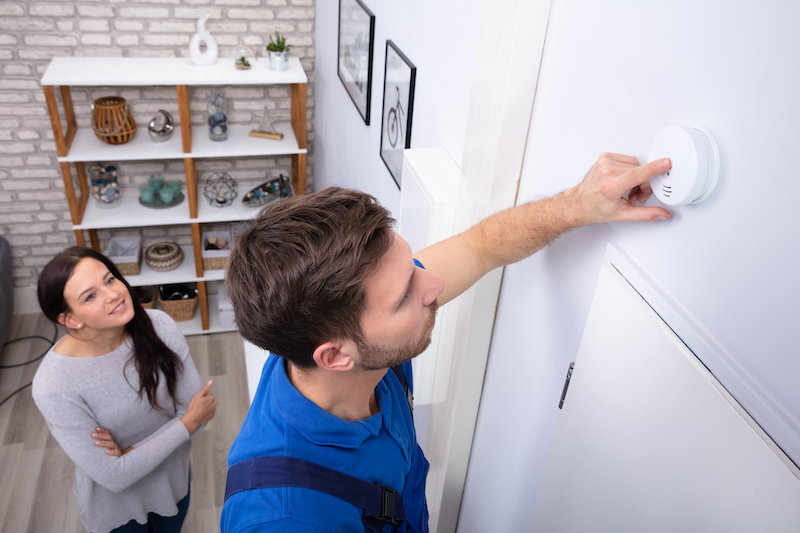A home maintenance calendar will allow you to maximize your efficiency and get everything done. To assist, we’ve compiled a list of things that need attention weekly, monthly, quarterly, biannually and annually, by season. To keep from becoming overwhelmed, simply take on things you can do each weekend.
Don’t forget to have the big jobs done by the professionals. Biting off more than you can chew can sometimes carry a heftier price tag in the long run.
Weekly
• Vacuum the floors. A neglected carpet can play host to dirt, dust, mites, and mold.
• Wipe down stovetop and vent. Detach the filter from the hood, then soak it in a cleaning solution before brushing off any grease.
• Mow the lawn. When temperatures drop to around 40 degrees, most grass goes dormant, so you won’t need to cut it until the weather warms up again.
• Clean windowsills. Usually a simple wipe-down is enough, but if there’s buildup, sprinkle baking soda over the track and sill, then spray with water and vinegar. After a few minutes, scrub it clean.
• Wipe down kitchen appliances. Clean them all—microwave, oven, refrigerator—inside and out at least once a week.
Monthly
• Inspect, and possibly change out HVAC filters. If the filter is dirty, change it; otherwise, inspect it again next month.
• Clean kitchen sink disposal. Put some vinegar in an ice tray and let it freeze, then run the ice cubes through the disposal. It freshens the disposal and sharpens the blades.
• Clean range hood filters. Use a degreaser from an auto parts store mixed with hot water. Let the filter sit for a few minutes, rinse it off, and you’re good to go.
• Inspect your fire extinguisher(s). Be sure that the extinguisher is easily accessible and is unblocked, that the gauge shows adequate pressure, and that it has no visible signs of wear and tear.
Quarterly
• Test smoke/carbon dioxide detectors.
• Test garage door auto-reverse feature. Place a 2×4 on the ground where the door would close. It should reverse when the door hits the wood. If you have photo-electric sensors, place something in front of them (not your body). If the door doesn’t immediately go back up, you have a problem.
• Run water and flush toilets in unused spaces. Sometimes out-of-sight places like seldomly-used guest suites can also be out-of-mind. Don’t forget about rooms and bathrooms that you don’t use every day.
• Check water softener, add salt if needed. It only takes about five seconds.
Biannually
• Test your water heater’s pressure valve. This will prevent mineral and corrosion buildup and help your heater run more efficiently.
• Give your house a deep clean. Take one Saturday every six months with your whole family, and clean the appliances, windows, dust every nook and cranny (including the closets), etc.
• Replace batteries in smoke/carbon dioxide detectors. Change these out every six months to give yourself and your family the added security.
• Vacuum your refrigerator coils. The fridge can use up to 15 percent of your home’s total power, so you want it running as efficiently as possible. You’ll save up to $100 a year.
Annually (by Season)
Spring
• Check exterior drainage. Make sure rainwater flows away from the house and that puddles don’t stand for more than 24 hours. If anything is questionable, check gutters, grade the area with some dirt, or hire professionals to raise the pavement to drain properly.
• Clean gutters. You can definitely do this one yourself, but why?
• Inspect the exterior of your home. Paint chipping? Siding damaged from winter? Holes in your brick? Foundation cracking? A good silicone/caulk can fix many of these problems.
• Service your A/C. Having it serviced by a professional should be around $100 or less.
• Repair/replace damaged window screens.
• Clear dead plants/shrubs.
• Check trees for interference with electric lines. Have these professionally trimmed if necessary.
• Inspect roofing for damage, leaks, etc. Repair as needed; you may need a professional.
Summer
• Check grout in bathrooms, kitchen, etc. This will prolong the life and aesthetics of your tiled surfaces.
• Inspect plumbing for leaks and clean aerators on faucets. If you have poor water pressure out of a faucet, the aerator is likely the issue, and it’s an easy fix.
• Take care of any insect problems you may have. Keep cobwebs clear, have ant poison handy, make sure all doors are tightly closed.
• Clean and repair deck/patio as needed. Wash and possibly re-stain. Check for any loose boards or posts.
• Check and clean dryer vent and other exhaust vents to exterior of home.
• Clean garage.
Fall
• Flush hot water heater and remove sediment. This prolongs the life of the heater and helps with efficiency.
• Winterize A/C systems. Have a cover ready for the outside unit with a tarp or plastic sheeting and secure with bungee cords if a freeze is in the forecast.
• Get heating system ready for winter. Check for leaks in doors and windows. Make sure heating vents are open and unblocked. Get furnace serviced/inspected at least every other year, preferably annually. Don’t forget about fireplaces if you have them.
• Turn off and flush outdoor water faucets. Flush hoses and store them. Winterize sprinkler systems as well.
• Get chimney cleaned, if you have one.
• Check driveway/pavement for cracks. Make sure to have any cracks re-sealed before winter; water can freeze and expand in the cracks, causing more damage.
Winter
• Test your electricity to the extent that you can. Be extra careful when working with electricity. You can do a couple things on your own, though. Check that all outlets work, including your GFCI outlets.
• Tighten any handles, knobs, racks, etc. Inspect anything that could have a loose screw.
• Check all locks and deadbolts on your doors and windows. If anything doesn’t work right, replace it.
• Check caulking around showers and bathtubs; repair as needed.
• Remove shower heads and clean sediment. This prolongs their life and helps with water pressure as well.



